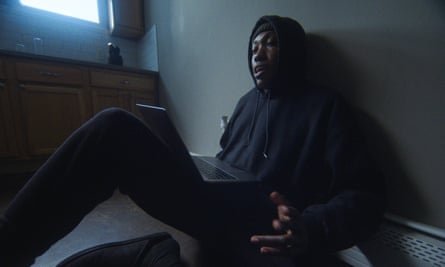I
In September of 2001, rapper Mac, whose real name is McKinley Phipps Jr., was given a 30-year prison sentence for manslaughter. A year and a half earlier, a shooting occurred outside a club where Mac was supposed to perform in Slidell, Louisiana, leading to the death of Barron Victor Jr., who was only 19 years old. Mac, who was 22 at the time, claimed his innocence even though the evidence against him was weak – there was no gun that could link him to the crime, multiple witnesses retracted their statements, and someone else confessed to being the shooter. However, the prosecution had a strong piece of evidence: Mac, a talented rapper from New Orleans who had been releasing music since the age of 13, had lyrics referencing murder.
In the film As We Speak: Rap Music on Trial, Phipps is heard repeating the words “Murder, murder, kill, kill”. This documentary explores the alarming trend of rap lyrics being used to convict individuals. In one case, prosecutors combined a line from a different song, “Pull the trigger, put a bullet in your head,” to paint the portrait of a murderer. Despite lack of concrete evidence such as DNA or a confession, an all-white jury found the lyrics to be sufficient proof. Phipps was ultimately sentenced to over 21 years in prison before being granted clemency in 2021.
Phipps is a well-known example among many others of rap lyrics being used as evidence in over 700 criminal cases. This practice has been met with controversy and, as highlighted in the book “As We Speak,” is rooted in the systematic criminalization of Black individuals in the United States. Most artists understand the distinction between fiction and reality, but this is not always recognized in the courtroom. For instance, nobody mistakes Romeo and Juliet for a true story regardless of how convincingly it is portrayed. The fascination with murder is prevalent in various forms of media, from westerns to mafia films to popular television shows with morally complex protagonists. According to JM Harper, the director of the film, this is evident in society’s preoccupation with killers and their perspectives. However, when it comes to music created by Black individuals, a double standard seems to emerge. In the courtroom, it is no longer seen as entertainment, art, or self-expression, but instead, it is seen as personal testimony and evidence. This discrepancy is unreasonable.
Many famous songs by white artists contain lyrics about murder, such as Freddie Mercury’s “Bohemian Rhapsody” with the line “Mama, I just killed a man.” This can also be seen in Johnny Cash’s “I shot a man in Reno” and The Chicks’ “Goodbye Earl” which allude to killing someone. Taylor Swift’s song “No Body, No Crime” also follows a similar theme, where the narrator murders her friend’s cheating partner. Despite these lyrics, they are often perceived as fictional in both popular culture and legal contexts.
When the artist and beat are changed, the lyrics can be interpreted as threatening. These lyrics have often been used to label artists as belonging to gangs, as proof of criminal activity or intent, or to showcase their “violent” character. This has been a recurring issue of race, as seen in the Sundance film “As We Speak,” now available on Paramount+. The film explores the history of panics surrounding Black music, from slave spirituals to jazz and rock music. It references South Carolina’s Negro Act of 1740, which prohibited the use of African drums due to the belief that they incited violence (when in reality, they were a means of community and rebellion for the enslaved). In the documentary, rapper Killer Mike remarks, “The criminalization of hip-hop is not a new phenomenon. It is an old tactic that is rooted in the criminalization of Blackness. It is nothing more than a deceptive maneuver.”
The film As We Speak follows the structure of a road trip, but is based on the academic book Rap on Trial by Andrea L Dennis and Erik Nielson. Rapper Kemba, who is from the Bronx, visits various rap hotspots and speaks with individuals who have been caught up in the criminal justice system. Through his travels, he symbolically experiences the issues of prosecutorial misconduct, flawed convictions, and unjust plea deals. The film incorporates elements of history, personal stories, and speculation, taking the form of a trial simulation for Kemba and a modern day portrayal of Romeo and Juliet performed by Chicago drill artists. Director Harper explains that the film uses the same techniques as hip-hop, blending fact and fiction, memories, hopes, and dreams to create a unique final product that cannot be broken down into its individual parts.
Kemba, whose real name is Matthew Jefferson, was not more knowledgeable about the topic than the average person. In an interview with the Guardian, he explained, “If you’re involved in hip-hop, you’re aware that things are happening, but you don’t have all the details.” However, according to him, it is these details that are most important. Some of these details include Killer Mike’s personal account of how rap was the only genre that truly captured the impact of the crack epidemic in Atlanta, Phipps’ journey to rebuilding his life and career after being incarcerated in New Orleans, and the legal battles faced by underground artist Drakeo the Ruler in LA. In collaboration with producer Axl Beats and rapper Lavida Loca in London, Kemba delves into the city’s surveillance and censorship of drill artists specifically. One scene that stands out is when Kemba speaks with original members of Chicago’s drill scene, such as Sharron, Fatz Mack, Stash P, and Katie Got Bandz, about the rise of rap’s internet virality, exploitation of poverty, the connection between lyrics and authenticity, personal responsibility, and the tragic violence that has claimed the lives of many young artists in the industry.
During the Chicago visit, the topic of rap music delved into complex paradoxes regarding its role as an outlet for addressing systemic violence. The issue of authenticity, culpability, and the potential use of lyrics as evidence in trials were also brought up. Harper pointed out that some rappers expressed concern that the film might diminish their agency by claiming that nothing they say holds any meaning. This went against the purpose of defending their freedom of speech. The team recognized the need to add nuance to the conversation.

Display the image in fullscreen mode.
Kemba stated that it is common to make quick assumptions about rap music and violence without considering the specific details and nuances involved. She hopes that the film will shed light on these complexities and encourage a broader discussion.
Currently, the documentary film “As We Speak” is premiering during a time when changes are being made at the state level. California has recently implemented a law that restricts the use of lyrics as evidence in court. Similar efforts are being made in New York, Maryland, and Louisiana, where such laws could have potentially prevented individuals like Phipps from being incarcerated unfairly. According to Harper, this development in politics is a positive sign as it is at the highest levels where significant change can occur. Harper also believes that the ingrained prejudices of juries and judges, which have existed for centuries, will not change without external pressure to keep lyrics out of court proceedings.
According to the documentary, only a small fraction of cases – 1% – result in a trial, despite there being 700 documented instances of legal action taken against song lyrics. “We need to increase that number significantly,” Kemba stated. He also pointed out that the individuals targeted by this type of prosecution are not just popular rappers like Young Thug, but also everyday people with regular jobs, such as Uber drivers. The definition of a rapper should not be limited to celebrities, as these cases primarily involve marginalized young Black and brown individuals who simply write lyrics.
The term “rapper” carries a lot of weight and can immediately trigger assumptions and prejudices in people. It has become a powerful label in such situations,” he stated. He believes that this is why the film is important, and for viewers to truly grasp its message, they must open themselves up and let go of any preconceived ideas.
-
Currently, As We Speak can be accessed on Paramount+.
Source: theguardian.com


